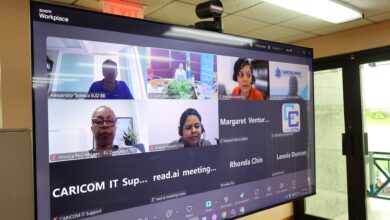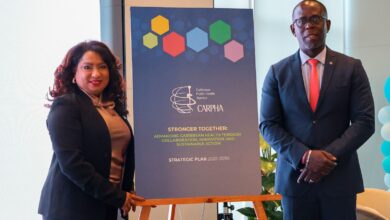(CARICOM Secretariat, Turkeyen, Greater Georgetown, Guyana) The Regional Symposium on Services which opened Wednesday morning in St. John’s Antigua and Barbuda, is being hailed as an exciting initiative that should result in the reversal of a history of poor implementation of regional decisions.
The Symposium is being held by the CARICOM Secretariat with support from the United Kingdom Department for International Development (DFID), the Spanish Agency for International Cooperation for Development (AECID), and the United Nations Development Programme (UNDP) which were all represented at the forum.
In the face of increasing frustration with the lethargy of development, speakers at the formal opening ceremony challenged the Caribbean Community (CARICOM) to boost the rate of implementation of decisions for the integration movement, and also called on the Region’s private sector to take the lead in promoting growth and development.
The charge was led by Mr. Lawrence Placide, President of the Trinidad and Tobago Coalition of Service Industries, who acknowledged the private sector as the facilitator of growth, but pointed to the sector’s “increased disenchantment” with the “lethargic pace of implementation” of the CARICOM Single Market (CSM).
“It has been several years since CARICOM began to implement the free movement of persons, yet businesspersons continue to bitterly complain that entry into other CARICOM countries is based on the whim and fancy of immigration officers. It still is easier to enter regional partners under the pretense of vacation than to enter as a service provider. But service providers, especially small businesspersons and individuals unfailingly express great interest in the Service Providers Certificate when that possibility is brought to their attention. This, by the way, could also be a useful approach to financing the growing services coalitions in the Region,” Mr. Placide said.
He added that while the private sector saw value in the CARICOM Single Market and Economy (CSME), it was of the view that the CSME had lost its earlier momentum.
“I think it is fair to say that the private sector wants decisive action to be taken and is willing to play its part,” Mr. Placide told the gathering that included service providers from across the Community.
“We therefore see this Services Symposium as the first step towards reversing our history of poor implementation of regional decisions. At the end of this meeting, we should leave not only understanding more about the needs of the regional service sectors but more importantly, this meeting will, we hope, produce an action plan, with time-bound and measurable targets. These targets must be met if CARICOM hopes to restore the confidence of the business community which has long grown weary of unfulfilled promises,” Mr. Placide said.
His Excellency Edwin Carrington, Secretary-General of CARICOM whose remarks followed Mr. Placide’s, pointed to the need for the Community to work together to remove the constraints that were hampering development.
“I am looking forward to constructive discussions and to the setting out of a roadmap for the next part of the journey in the Caribbean integration process with services being a key driver. I urge everyone here to maintain the momentum and strive to ensure that whatever commitments we make here to developing the Services Sector are honoured. For that has been the Achilles’ heel of our Community – the implementation deficit,” the Secretary-General said.
The Services Sector as the largest sector of the Community, accounts for more than sixty-six percent of annual total output of goods and services – the GDP. It also accounts for more than seventy percent of those employed.
The Symposium, Mr. Carrington pointed out, was aimed at sensitising the key stakeholders in the sector on how to capitalise on the Region’s comparative advantage in the area of Services for export; developing a Draft Plan of Action for the period 2009-2014; and agreeing on the elements of the Services component of the Regional Strategic Plan for Development within the context of the CARICOM Single Market and Economy (CSME).
The objectives were set within the context of the on-going work to create the CARICOM Single Economy and were in keeping with the role identified for services in the Report entitled “Towards A Single Development Vision and the Role of the Single Economy” by Professor Norman Girvan. Professor Girvan in that Report identified the Services Sector as one of the major drivers of the economy for the Community.
The Opening Ceremony of the Symposium was chaired by His Excellency Ambassador Colin Murdoch, Permanent Secretary in the Ministry of, Ministry of Foreign Affairs and International Trade who described the event as an exciting, important and timely.
The Symposium concludes on Friday.





